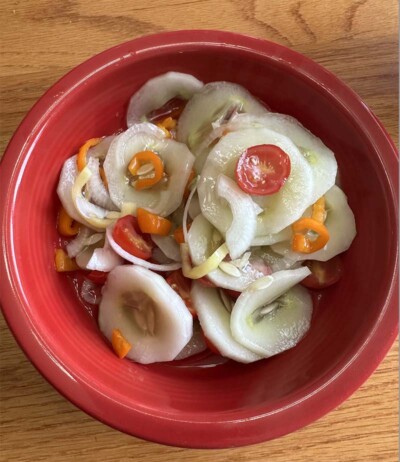This Week In Ag #128
“We’re serving depression food.” That’s how I describe the summer delicacy my wife prepares for social gatherings we host and attend. It’s a creation of cucumbers, peppers, onions and tomatoes – all grown from my garden – soaked in vinegar and sugar. A dish passed down by my grandmother, born out of necessity more so than culinary delight: simple, flavorful vegetables grown and then preserved.

Depression food
Most people automatically assume that my love of farming stems from my paternal side of multi-generational farmers. And they certainly played a big role. But much of my passion for agriculture comes from my Grandpa Vancil. He grew a massive garden. But he didn’t start doing it as a hobby, he did it to survive. The same reason he would fish and hunt. He taught me all those life skills and the patience required to perform them.
You see, Grandpa Vancil lived during the Great Depression. Much of his childhood was spent working in Civilian Conservations Corps work camps set up by the government.
Food was incredibly scarce. So he and his family were forced to grow or catch their own. What they didn’t eat fresh, they preserved by a variety of means.
My grandma canned much of the food they grew. In fact, growing up, I rarely saw store bought canned vegetables at her house. They consumed her canned produce until next year’s garden yielded fresh. And their freezer was also full of fish they caught.
To me, Grandpa and Grandma Vancil will always epitomize “The Greatest Generation”. They endured The Great Depression, he served in WWII as she prayed for his return while working as a real-life Rosie the Riveter. Upon his return from Europe, they raised a family and he got a job working on the railroad. Hard labor to say the least in those days, but he never complained.
Through hard work and longevity their financial situation, like many of their fellow Americans, changed from the dark days of the depression. But their way of life did not. Grandpa continued to plant a massive garden every year of his life. And much of what was not eaten fresh was canned.
Each year, I look forward to picking our own vegetables and making “depression food.” I savor every bite. For me, it’s more than a matter of taste. It’s a tribute to my heroes.
Related Posts

Bio Energizer® Improves SVI by 50% at Citrus Plant Wastewater Treatment
A citrus plant struggled with poor settling in the clarifier of its wastewater treatment, which caused the sludge blanket to remain high. Even at a low flow rate of 1.2 million gallons per day (MGD), the high sludge blanked allowed less than 18” of free board. The slightest flow increase caused solids to carry over

Harvest The Most Important Crop Now
As harvest season wraps up, don’t overlook the unharvested crop in your crop residues. With FERTIL HUMUS, you can transform leftover stubble into a powerful soil-building tool. This carbon-based, microbial-enhancing solution breaks down residues, recycles nutrients, and strengthens soil structure, all while saving on fertilizer and tillage costs.

How the “Three Sisters” Fed a New World
Discover how the Native American “Three Sisters” farming system, corn, beans, and squash, created a powerful, regenerative growing method that helped feed the New World and shaped sustainable agriculture long before modern science.

